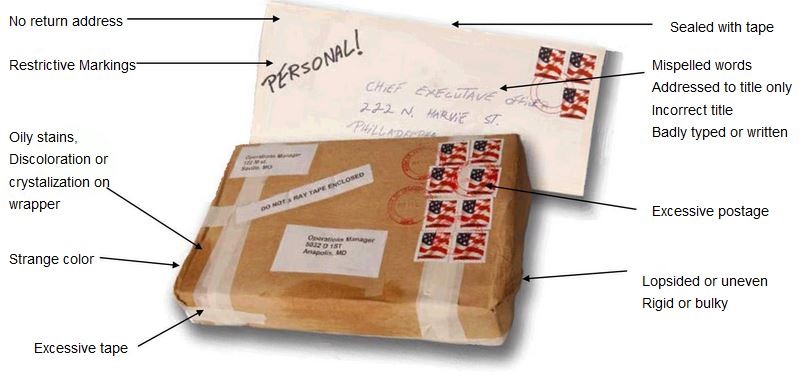Bomb Threats and Suspicious Packages
In keeping you safe, we at PCC Police and Safety Services are ever-watchful of potentially dangerous situations. In the unlikely event that someone threatens to bring explosives to campus, or if you find a suspicious package that might contain chemical, explosive, or biological weapons, emergency personnel will promptly respond to your call and let you know what to do next.
While you might want to contact friends or family, it’s best to turn off cell phones so there isn’t any interference with our attempts to monitor the situation. Also, as you evacuate, bring your personal belongings with you and try to notice any unfamiliar or suspicious items. You can report them to us, and we’ll decide how to handle them. Because someone might have tampered with building wiring, it’s safest to leave light switches and thermostats at their current settings and to leave windows and doors open. However, if time permits, you can turn off other electrical equipment such as computers or overhead projectors.
Do your best to follow these suggestions while actively listening for directives from emergency personnel.
How do know what makes a package “suspicious”? And what should you do?
Sometimes a person will make a telephone or email threat prior to leaving a package, and hopefully, someone will contact us at (626) 585-7484 as soon as that happens (see below sections on how to respond to these types of threats). Some suspicious-looking packages are not actually weapons or look humorous because of how they are addressed or marked—but it’s still important to take them seriously. Here's an example of what one might look like:

So, if you see one, be careful to avoid touching it and encourage others in the area to do the same. Although you might want to sniff, smell, or shake the package to see what’s in it, it’s safer to wait for us to investigate. If you can, calmly encourage others to leave the area as soon as possible.
What if you have already opened the package?
Since it might contain dangerous powders or agents, be sure to wash your hands before touching anything else, and you don’t need to clean up anything that might have spilled out. Our goal is to protect you while minimizing contamination—so you can help by staying nearby and letting us know who else was in the area when you found the package. We’ll take care of the rest.
What if someone makes a phone threat about an explosive device or a weapon?
If you can record the live call, that would be most helpful. Otherwise, signal to nearby faculty or staff that a threat is occurring, and try to write what the caller tells you.
Here are some steps you can take:
- Write exactly what the caller says—if possible, ask him or her to repeat the information.
- Try to keep the caller speaking with you by asking questions.
- For instance, try asking where the device or the person is. Calmly let the caller know that many people could be harmed; it’s possible that the person is calling because he or she doesn’t actually want to follow through with this threat.
- As you listen, do you notice any background noises like other voices, cars, freeways, or music? Is there anything distinct about the caller’s voice or the way the person speaks? Is his or her tone calm or angry?
- Even if the caller hangs up, keep your end of the call active or press “hold.” Cell phones might automatically disconnect, and that’s okay, just take note of when the call ended and how long it lasted.
We appreciate you taking the time to read this and prepare yourself for this type of threat, and of course, be sure to call us at PCC Police and Safety Services at (626) 585-7484 to share your notes and observations with us; this will help us to coordinate with the Pasadena Police and Fire Departments. We also understand that you will want to tell other classmates or friends on campus about what happened or post information on social media, but it’s safest for everyone if you allow us notify others. Our goal is to keep everyone safe and to do this we need to avoid causing panic.
What if you find an emailed threat?
Treat it as a genuine threat, even if it seems like it might be a joke or you are not sure what the person’s intent is.
These can be frightening, especially since they could be from someone on campus or across the world. Fortunately, we can help. With assistance from PCC Information Technology Services, we can trace emails or identify server logs to see how a message was handled.
So, if you find an emailed, social media, or otherwise digital threat, just keep it accessible on your screen. Then call us (from a campus phone if necessary), so we can record all the important information.
Sometimes a threat is written on paper, in a restroom, or on a wall.
These might have useful fingerprints or other evidence, so it’s best to avoid touching them. Instead, immediately call us at PCC Police and Safety Services (626) 585-7484. Try to take note of where and when you found the threat and whether you noticed anything else unusual about the people or area nearby. While you might desire to notify other people in the area, we can handle that so others aren’t unnecessarily frightened. However, if you ever suspect that your life or others’ lives are in danger, call 911 from a cellular phone for local police and emergency services.
But, what if PCC Police instruct you to bring the document to them? How can you handle it without damaging potential evidence or being harmed yourself?
It is unlikely that we will ask you to do this. However, if the threatening document is small enough, we might instruct you to place it carefully in an envelope or bag—even if it’s already in an envelope, since that’s potentially part of the evidence. If the threat is on a large object, we would like you to keep it in your sight and to keep others away from it until we arrive.
